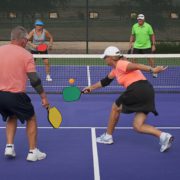Common Pickleball Injuries and what to do
If you haven’t heard of pickleball yet, odds are good you will very soon. Pickleball is quickly becoming one of the most popular recreational sports in the US, especially in the over 50 crowd, and especially in Portsmouth and all around the Seacoast of New Hampshire. It’s essentially a cross between tennis, racket ball, and ping pong. The court is smaller than in tennis and the net is set lower. People love pickleball because it’s a great way to not only get exercise – but to socialize and meet new friends.
But like any other sport, injuries happen. And because injuries become more significant and harder to rehabilitate as you get older – it’s important to have an awareness about the common injuries that tend to occur in pickleball players and what you can do to prevent them.
Here are four of the most common injuries I see in Pickleball and what you can do:
1. Rotator cuff strains
Your rotator cuff is a group of muscles in your shoulder that play a critical role in both stability and mobility of your shoulder joint. Because pickleball involves repetitive swinging – your shoulder is at risk for overuse injuries and strains. To help minimize the risk of rotator cuff injury, it’s important to ensure that you have good mobility in your shoulder joint, and good mid-back or scapular strength. Your scapula is also called your shoulder blade – if your scapular muscles are weak – then your rotator cuff might be tasked with extra work or strain. The more mobile your shoulder is, and the more balanced the strength around your shoulder joint is, the more effective your rotator cuff will be when playing a repetitive sport like pickleball.
2. “Pickleball” elbow
This is pretty much identical to tennis elbow – known medically as lateral epicondylitis. It causes pain and tenderness on the side of your elbow or forearm – and happens due to overuse of your forearm muscles – typically due to poor mechanics above, below, or in the elbow itself. To prevent this, you want to make sure the areas above and below your elbow joint are strong and stable. Your shoulder needs to be both strong and mobile for when you swing – otherwise your elbow will compensate and try to help out. Your wrist needs to be stable when holding the racket – or your elbow will need to kick in and try to help. The ligaments and muscles around your elbow aren’t designed to do the job of both your shoulder and your wrist – so if you don’t give these areas some love – you could end up with pickleball elbow.
3. Ankle sprains
Because there is a lot of pivoting and starting/stopping directions during pickleball – it’s easy to sprain your ankle if you’re not careful. Most ankle sprains occur from rolling on the outside of your ankle. This results in bruising, pain and swelling of the ligaments along the side of your ankle. While this injury does heal over time, it can often result in chronic weakening or scarring of those ligaments as well as tightness in your ankle joint – which only makes you susceptible to future ankle sprains. It’s best to make sure you have a good warm-up before you play. One that conditions your ankle and feet for quick stepping and flexibility. You also want to make sure you have strong hip muscles. If your side hip muscles aren’t strong and helping you stay stable in your pelvis – your ankle will take the brunt – and you’ll be more likely to sprain it.
4. Achilles tendonitis
Your Achilles tendon is a very strong, thick tendon that connects your calf muscle to your heel. It’s responsible for generating a lot of power to help you spring off your foot and jump. Its power is generated from its ability to stretch and then contract. Therefore, your ankle needs to have good mobility in order for your Achilles tendon to do its job. If your ankle is stiff and tight, you could be at risk for developing Achilles tendonitis. One other consideration is the strength of your glutes (or butt). Calf muscles love to compensate for weak gluteal muscles. If that happens over and over, they become tight and can put extra strain on your Achilles tendon – since they are connected. So make sure your butt is strong and your ankle is mobile in order to help prevent this common pickleball injury.
If you’re a pickleball lover – or perhaps wanting to get into this popular sport for the first time – I hope these tips help you to become more aware of what you can do to protect yourself from injury.
Ready to get help with your pain or injury?
Request to speak to one of my specialists to see if we would be the right fit to help you get out of pain. CLICK HERE to request a Free Discovery with one of my specialists.
Dr. Carrie Jose, Physical Therapist and Pilates expert, owns CJ Physical Therapy & Pilates in Portsmouth, NH.


